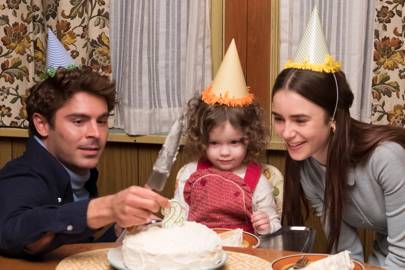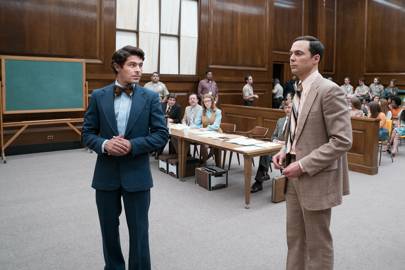I’ve seen Zac Efron naked before. Not in real life, obviously, but somewhere over the Atlantic Ocean while watching his 2016 De Niro comedy, Dirty Grandpa, on a flight. That’s fine. I don’t object to comedic nudity to distract from turbulence. I didn’t, however, expect to see him naked once again in Extremely Wicked, Shockingly Evil And Vile, the new Ted Bundy biopic that’s framed from the perspective of his long-term partner, Liz Kloepfer (Lily Collins). Curiously, his bare bum isn’t flashed to the camera during an intimate scene between the couple, it happens while he’s incarcerated. So why did I need to see it?
Shortly after the release of the documentary Conversations With A Killer: The Ted Bundy Tapes on Netflix this January, a seemingly frustrated social media manager for the platform felt compelled to tweet the following from the company’s official account: “I've seen a lot of talk about Ted Bundy’s alleged hotness and would like to gently remind everyone that there are literally thousands of hot men on the service – almost all of whom are not convicted serial murderers.” That viewers needed to be reminded of this fact is bizarre in itself, but it points towards a broader fascination with bad men that has spawned from the immense popularity of the true crime genre.

Directed by Joe Berlinger, the same man behind Extremely Wicked, Conversations With A Killer arrived on Netflix as a four-part series that condensed the 100 hours of video footage yielded from interviews with Bundy after he was convicted. It didn’t add anything new to the Ted Bundy narrative, it only worked to confirm his deep-seated narcissism through his own self-indulgent soliloquies about his life. But while many found his ramblings repugnant, many more only took one thing away from the docuseries: that Bundy was a kind of a little bit sexy… ish. It wasn’t a particularly shocking revelation: after all, Bundy’s notoriety as a serial killer is largely thanks to his appearance. He lured victims in with his charm and managed to briefly convince a nation of his innocence through wooing courtrooms full of young female fans who had come to support him. But accompanied by the knowledge that he was a man who eventually confessed to murdering 30 women, with experts predicting that he probably killed closer to 100, it seems more than a little weird that all we can talk about is his relatively mediocre appearance.
In Extremely Wicked, Zac Efron as Bundy makes perfect sense: if Ted Bundy was hot for a violent criminal who once bit a woman’s nipple off, then Efron – who is hot by most people’s standards – is a fitting glossy Hollywood substitute for him. I’m just not convinced that we really needed a substitute for Bundy on the big screen in the first place. While the film’s focus on his relationship with Liz and the impact his crimes had on her steers it away from feeling like a gratuitous attempt to cash in on true crime’s current popularity, it still props up the disturbing allure that serial killers seem to have on the public. The film doesn’t purposefully set out to glamourise Bundy, but it doesn’t do much to frame him as a true villain either. It’s not until it ends and photographs of his victims are shown that the gravity of his crimes truly hits home. Up until then, you’re almost just as enraptured by his charm as Liz was.

In the wake of Me Too, films such as as Extremely Wicked seem like an especially unnecessary exercise. However anyone justifies the film – whether it’s by insisting that it serves some sort of educational purpose, or that it even offers a different perspective on the way abusive men often operate – it’s made redundant by the fact that society is now hyper-aware of the capability for bad men to do very bad things to women. Thanks to those who shared their stories of abuse post-Weinstein, we now know how men like Bundy manipulate and groom their victims. After watching so many powerful men have their names tarnished by their own abusive actions, we’re no longer surprised to learn that a charming, white, educated man could commit heinous crimes. Yes, Bundy’s actions were extremely wicked, shockingly evil and vile, but regurgitating them in a blockbuster that practically dares its female audience to fancy him does nothing to move the conversation forward.
Our morbid fascination with serial killers is unlikely to fizzle out anytime soon; we’re still talking about Jack The Ripper over a century after his victims died. But let’s not pretend that this obsession feeds anything other than a grotesque curiosity about the darker side of the human psyche. True crime films such as Extremely Wicked are fundamentally made to entertain; that it’s deemed appropriate to use source material that comes from the suffering of real women is just evidence of a society that is still tripping over itself to catch up with modern feminism. Fair enough, satiate the appetite for stories like Bundy’s with plain-talking books and documentaries, but don’t give these killers the glory of being turned into Hollywood heartthrobs. And don’t show us Bundy’s bum: show us the devastating impact his crimes had on his victims and their families instead. At least that way we might forget about his appearance and remember the real reason for his infamy.
Now read:
Extremely Wicked, Shockingly Evil And Vile is the ultimate film about gaslighting
'How I became obsessed with serial killers'
Dead Man Talking is the new true crime podcast that will have you hooked
https://www.gq-magazine.co.uk/article/extremely-wicked-shockingly-evil-and-vile-ted-bundy
2019-05-03 07:04:23Z
52780284472705
Bagikan Berita Ini














0 Response to "Why are we turning serial killers into Hollywood heartthrobs? - British GQ"
Post a Comment